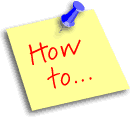
Write an Essay
Tips on writing that all-important A-grade college essay

Essay writing guidelines |
||
|
The challenge in academic writing is to express complex ideas simply. Follow these guidelines to help improve your academic papers. Don't try to adopt a learned tone your message, not your writing style, should show your knowledge and expertise.
Use active verbs Using active verbs is essential if you want to write with a direct authoritative style. Instead of using the impersonal passive verbs and third person viewpoint, you should write with strong, active verbs. Almost every authority on writing encourages you to use active verbs. Heres some typical advice to authors publishing research papers for The American Society for Testing Materials.
Look at these examples:
Notice the passive example sounds academic but takes an extra nine words to say the same information. It is no more objective than the alternative with active verbs. Although we naturally speak with active verbs, even when discussing academic subjects, the traditional academic writing style litters writing with unnecessary passive verbs. Any sentence can be either active or passive. It is your choice as the author. Heres another example:
Whatever the subject of the essay, you can write with active verbs to make your writing style more direct, clear and forceful. If theres one piece of advice on writing style you should follow, its to use active verbs throughout your essays. |
||
| My Tip: StyleWriter is a great piece of software that accurately finds, scores and rates passive verbs in your writing. Youll get a Passive Index for your essay when you check it with StyleWriter. The lower the index the better. The program also highlights any passive verbs in your writing. By clicking a help screen, you can learn how editors switch passive verbs back to active verbs and save about one-third of the padding in most essays. Click here to see a StyleWriter screenshot. |